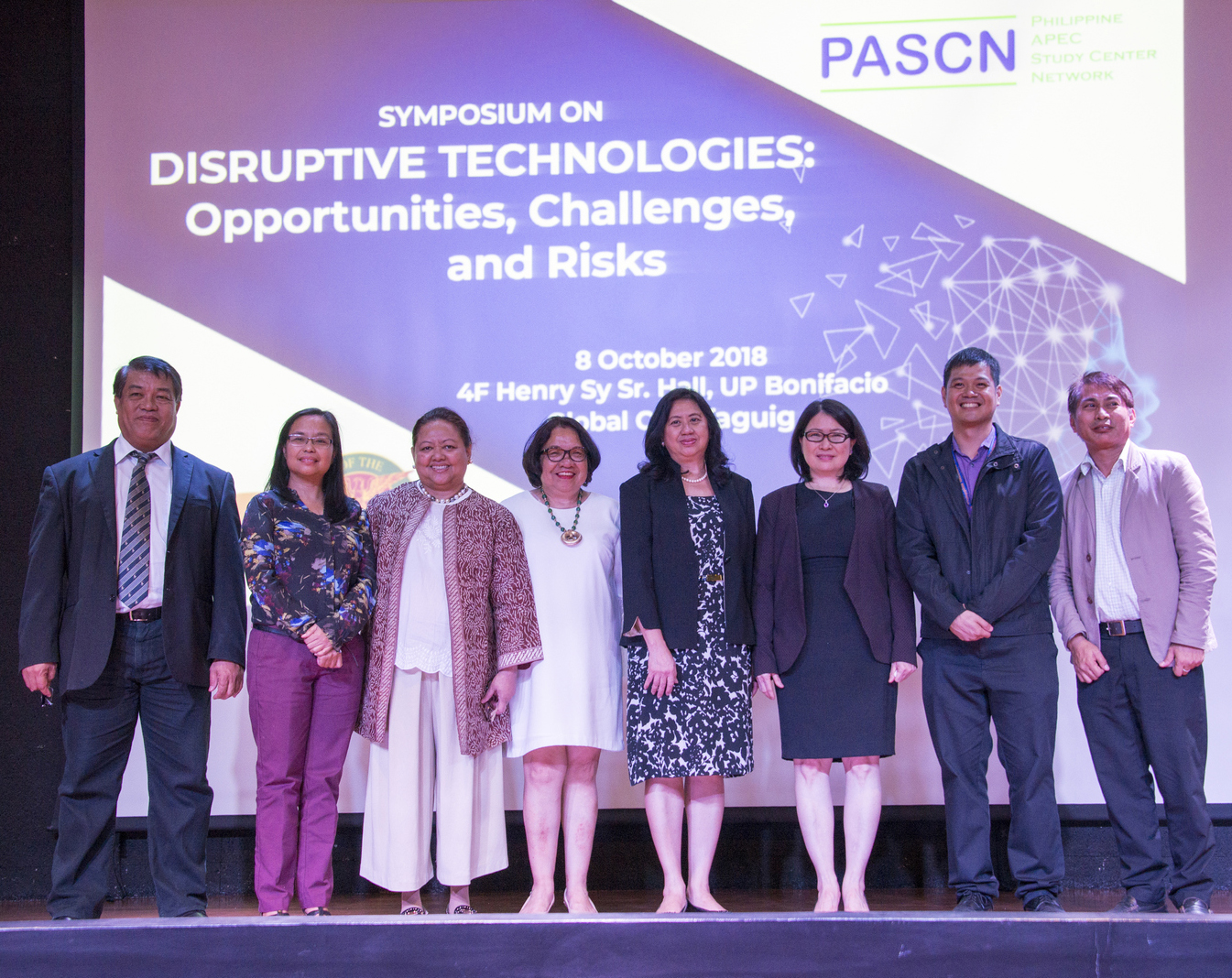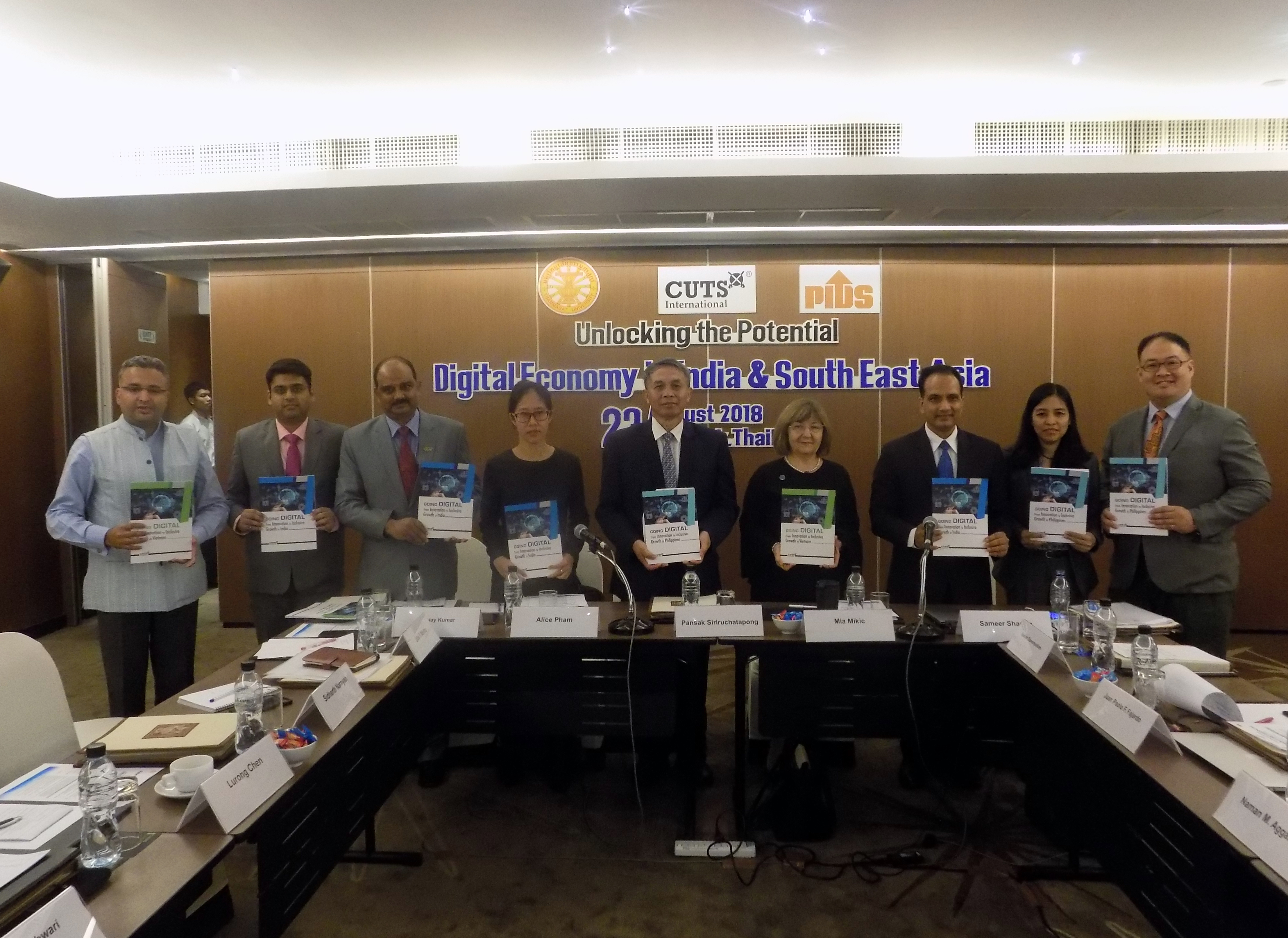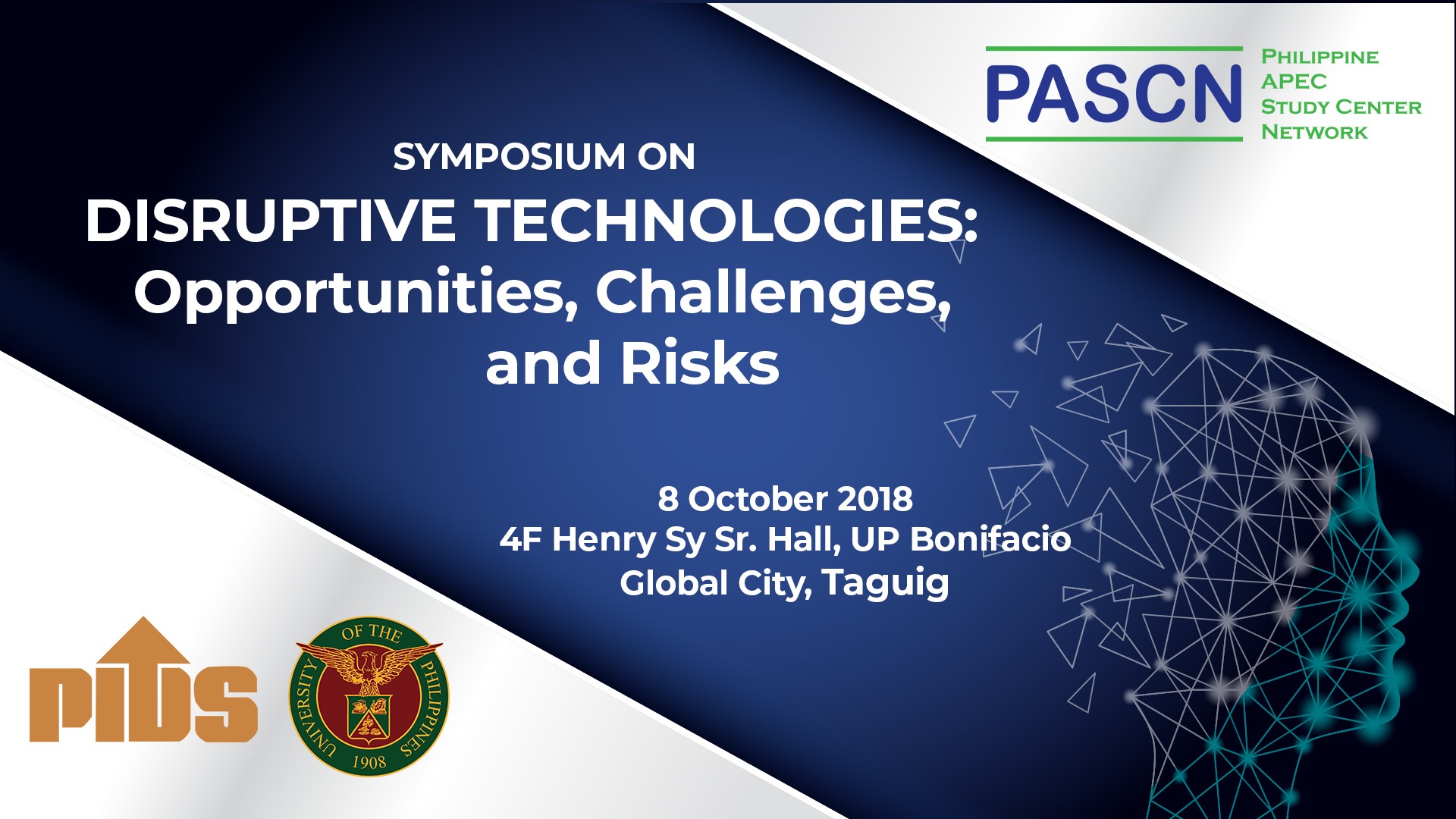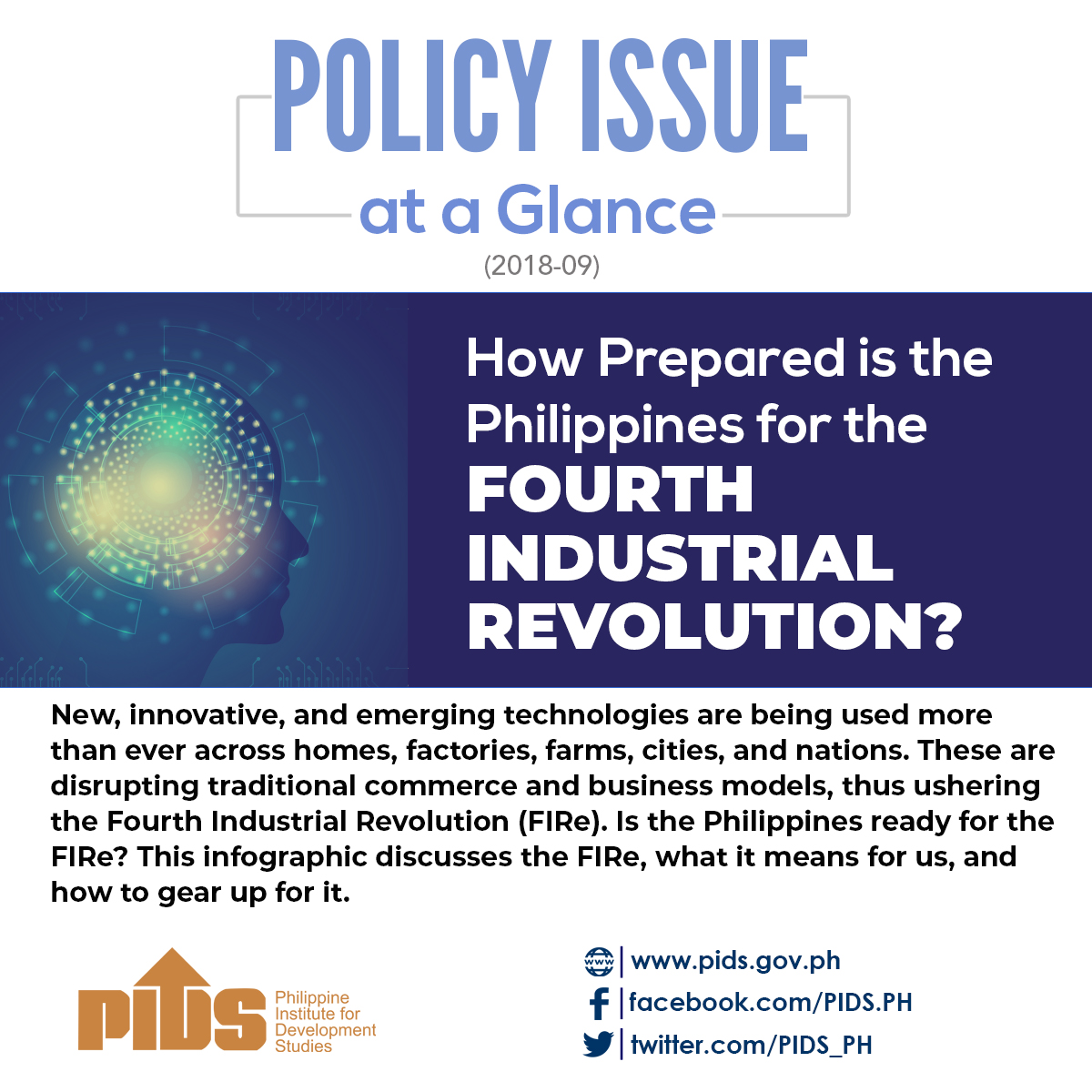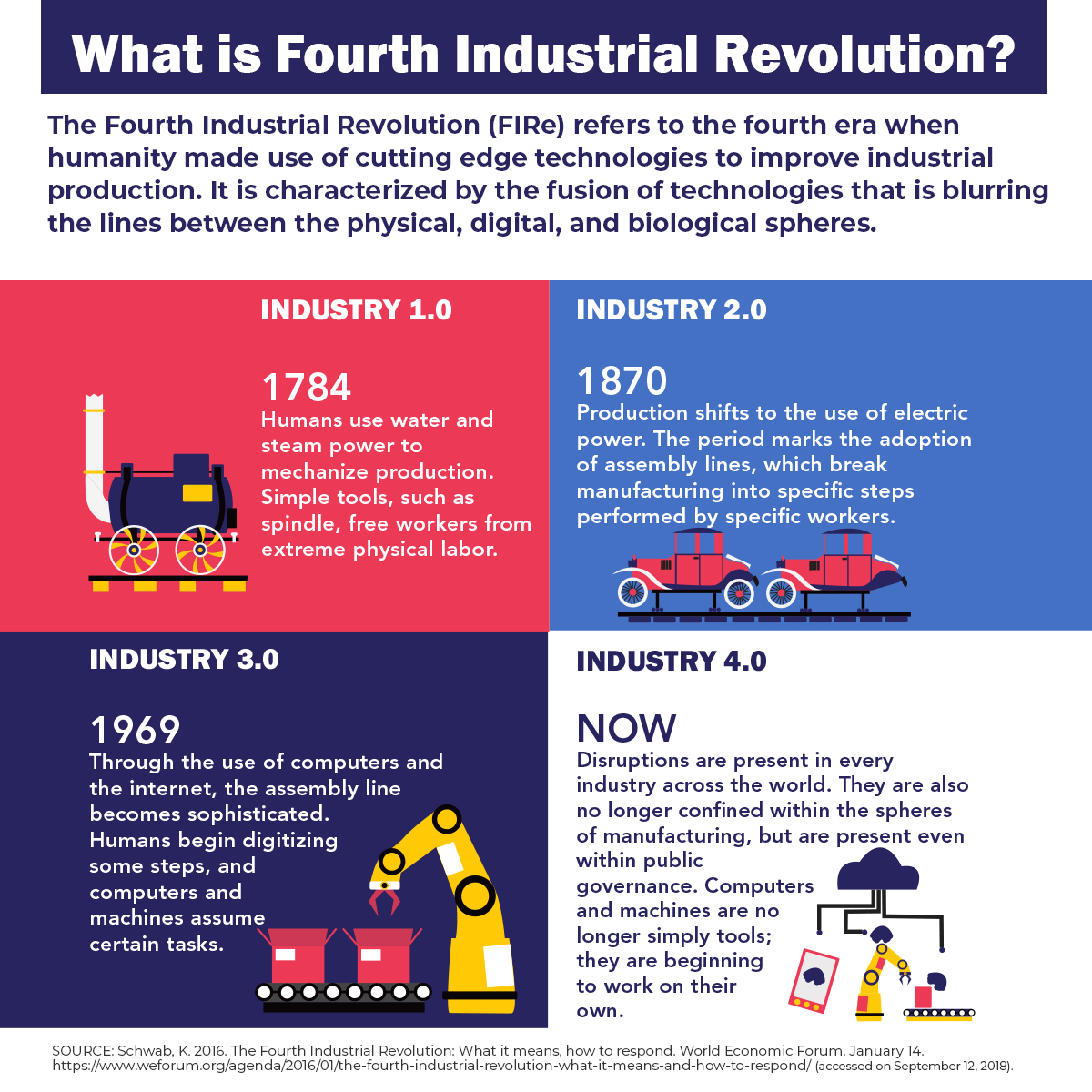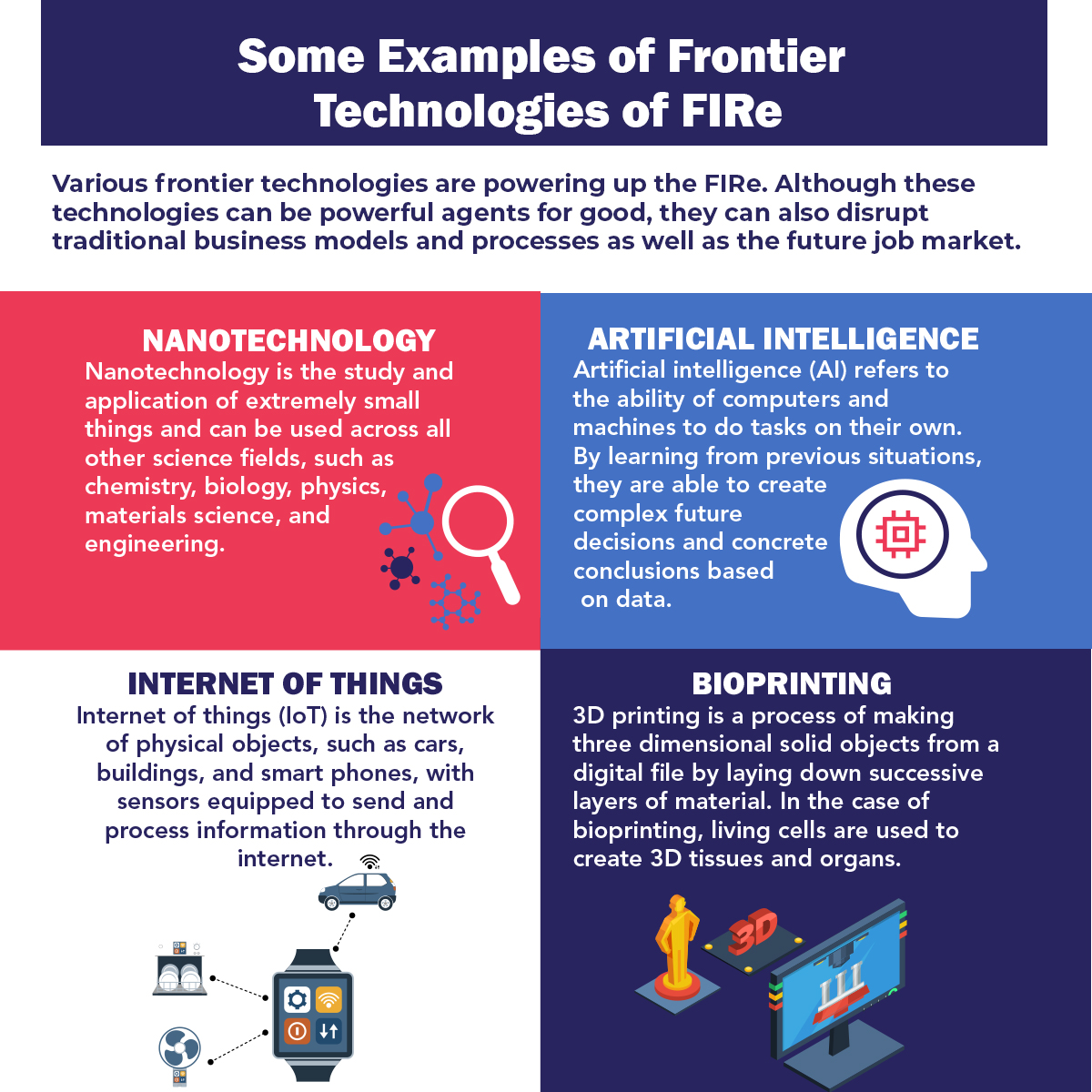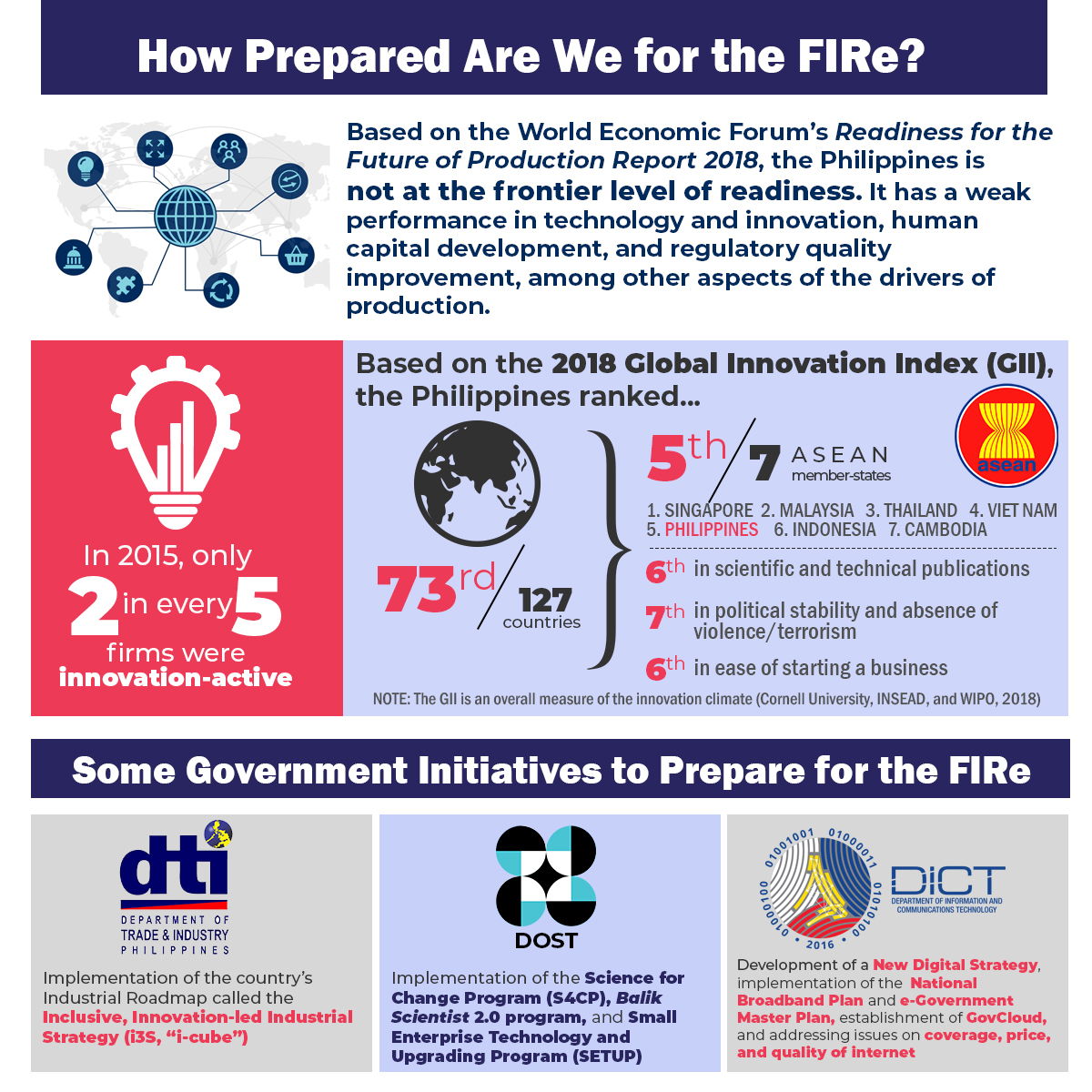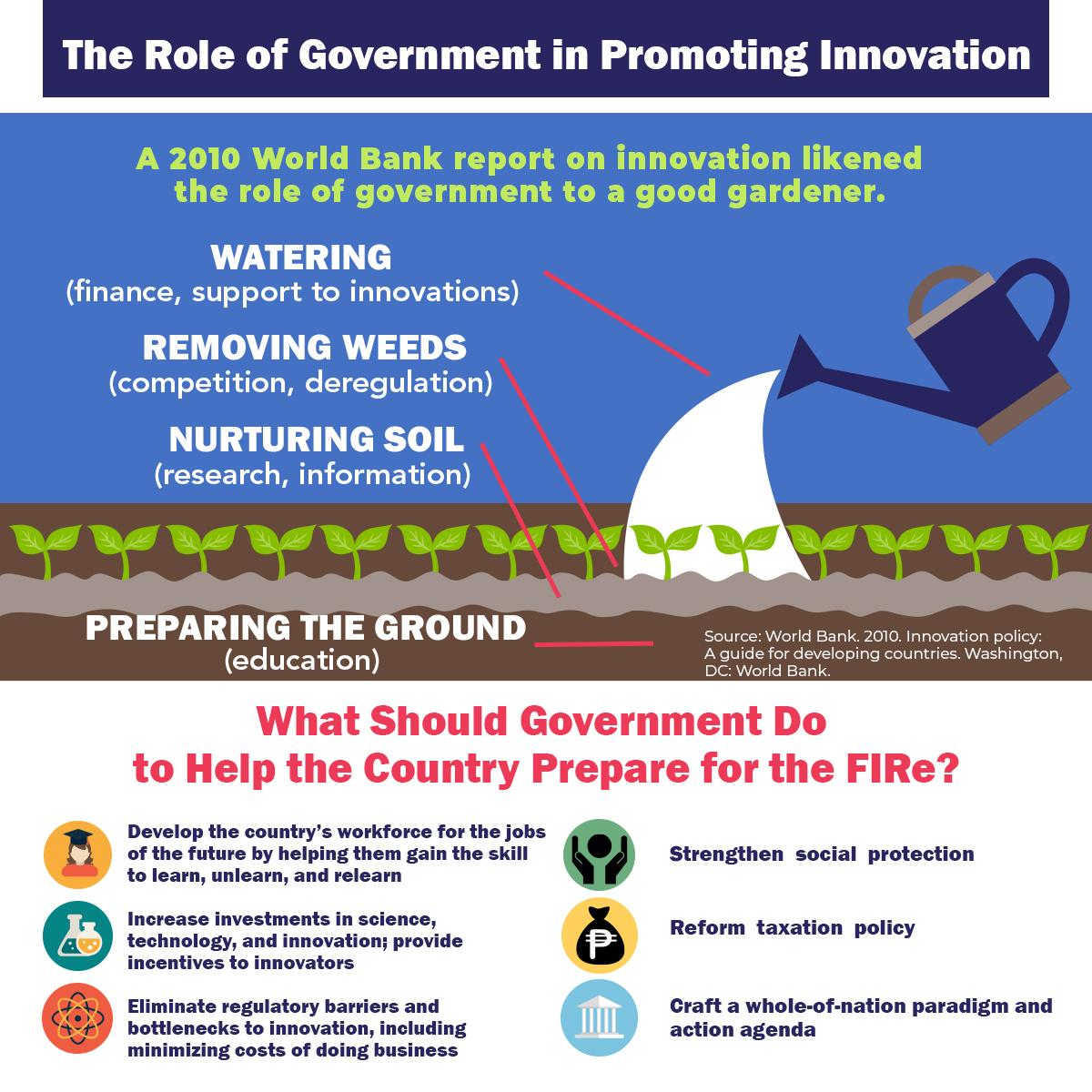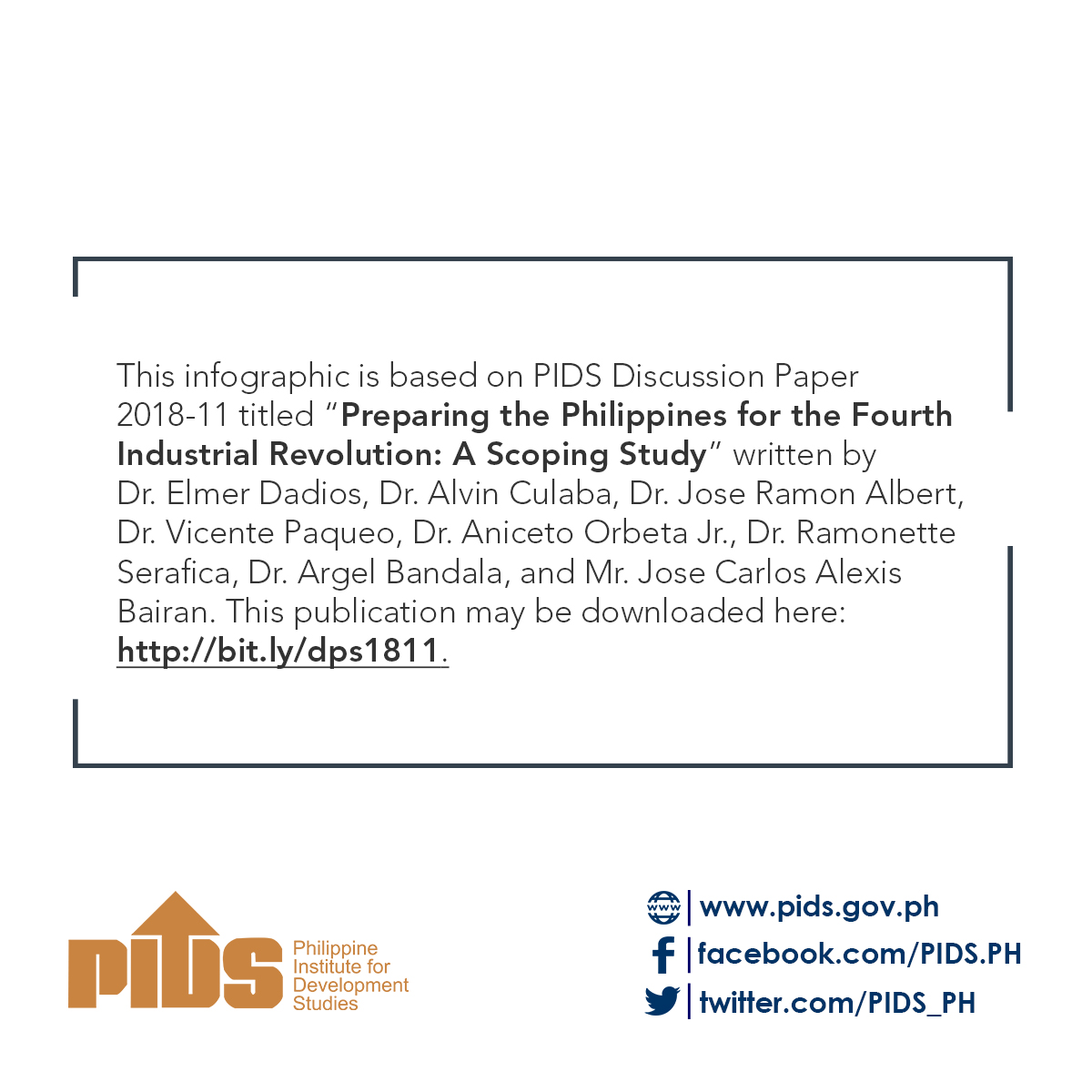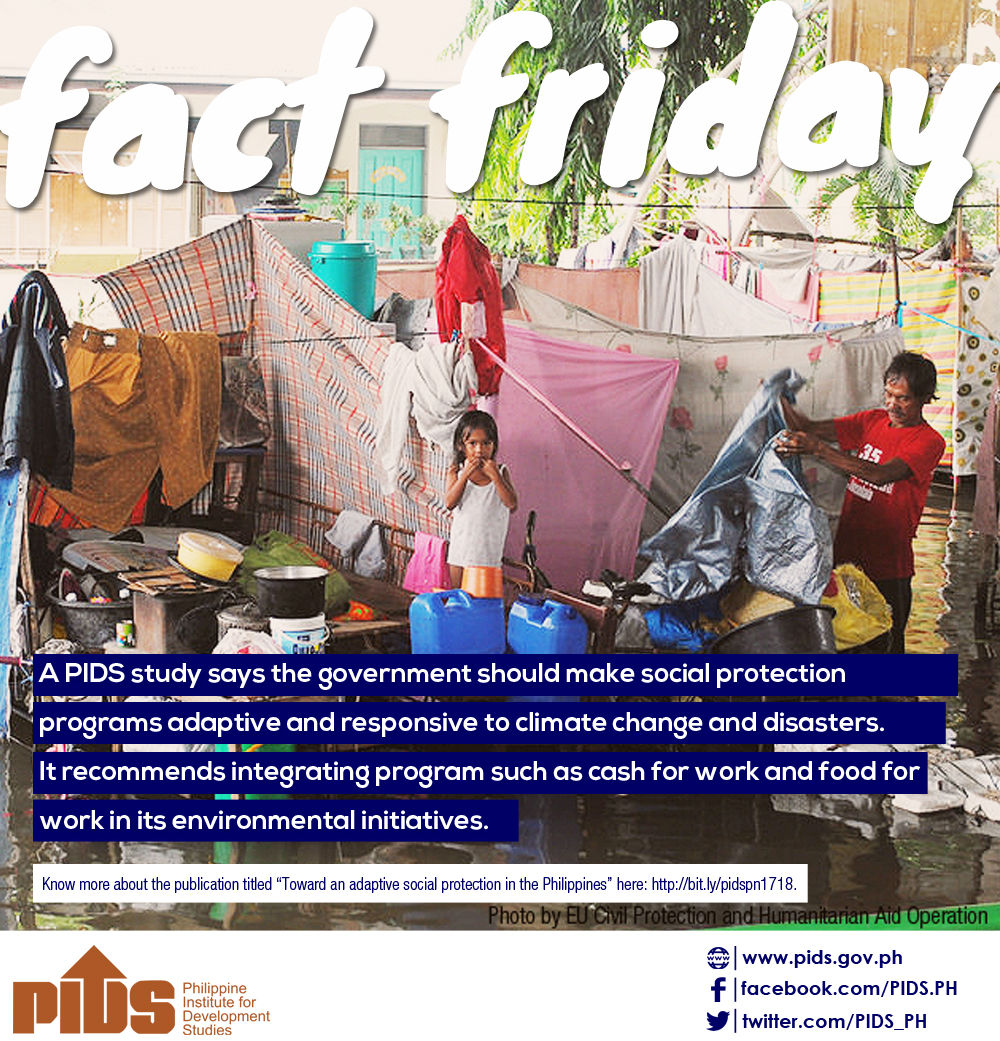Having trouble reading this email? View it in your browser. |
|||
 |
|||
|
|||
IN FOCUS: Reducing vulnerability to poverty
Poverty remains one of the biggest challenges for the Philippines despite the country’s generally good economic performance in recent years. Latest poverty data from the Philippine Statistics Authority (PSA) show that more than a fifth of the country’s total population, or roughly 22 million Filipinos, were still living below the national poverty line in 2015. Poverty reduction has been at the heart of international and national development agenda. Goal 1 of the United Nations’ Sustainable Development Goals is to “end poverty in all its forms everywhere”. In the Philippines, poverty reduction is also quite prominent in the government’s long-term and medium-term development plans. The 2017-2022 Philippine Development Plan targets to reduce poverty to 13–15 percent by 2022, while the AmBisyon Natin 2040 envisions the Philippines as a “prosperous, predominantly middle-class society where no one is poor” by 2040. Solving poverty, however, is a complex issue. Although the Philippines was able to cut down poverty from 26.6 percent in 2006 to 21.6 percent in 2015, this pace was slower compared to most countries in East Asia. In a 2018 publication, the World Bank attributed the slow poverty reduction rate to the less propoor pattern of growth, high inequality of income and opportunities, and the adverse impacts of natural disasters and conflict in the country. Shocks, such as natural disasters, inflation, income loss, conflicts, and wars, can negatively affect not only those identified as poor but also nonpoor but vulnerable households. Thus, in designing poverty reduction policies and programs, decisionmakers have to consider not only those who have been identified as poor but also those who are at a high risk of becoming poor. Likewise, an assessment of past and existing poverty alleviation programs is important to ensure they are well-targeted and public funds are being put to their best use. A number of studies by state think tank Philippine Institute for Development Studies (PIDS) have pointed out that despite the increase in the number of Filipinos who have been lifted out of poverty in the last decade, many have remained vulnerable. Unfortunately, the country’s official poverty statistics have not paid much attention to measuring Filipinos’ vulnerability to poverty or the probability of being poor in the future. A 2018 study of PIDS authored by Senior Research Fellow Jose Ramon Albert and Research Analyst Jana Flor Vizmanos estimated that the proportion of households in the Philippines vulnerable to income poverty is around double to triple the corresponding official poverty estimates. Since poverty is dynamic, with the poor exiting and the nonpoor sliding into poverty, Albert and Vizmanos pointed out the need for government to broaden the scope of assessments by taking into account both poverty and vulnerability estimates. This way, government will be able to design differentiated actions and programs for highly vulnerable and relatively vulnerable households. The authors highlighted the importance of managing risks systematically, particularly in terms of building risk resilience through social protection, to address Filipinos’ vulnerability to income poverty. To illustrate, the authors likened the elimination of poverty to treating the sick, which can either be curative (i.e., alleviating the conditions of the poor, and/or helping them exit out of poverty) or preventive (i.e., protecting those vulnerable from the risks and harmful effects of poverty by building the resilience of the vulnerable). These recommendations also support a 2017 PIDS study by PIDS President Celia Reyes and former Supervising Research Specialist Christian Mina. The authors noted that building resilience in coping with shocks and enhancing social protection and access to basic services are necessary to address vulnerability and inequality. They maintained that government can devise comprehensive strategies related to risk prevention, mitigation, and management, including strengthening of early warning and forecasting systems. For example, a 2017 study by PIDS Senior Research Fellow Connie Dacuycuy and Research Analyst Lora Kryz Baje found that chronic food poverty is higher in households that have experienced rainfall deviation than those that have not. To address the adverse effect of sustained weather fluctuations, this study urges local government units to invest in developing climate-smart agriculture that fits the needs of the community. It also calls for the government to explore adaptive social protection initiatives that support propoor climate change adaptation and disaster risk reduction by strengthening the resilience of vulnerable populations to shocks. Examining data on both poverty and vulnerability in formulating risk resilience measures will allow vulnerable households to reduce the effects of adverse events such as natural calamities, price shocks, and idiosyncratic shocks, on their conditions. It will also empower them to seize the moment and take advantage of opportunities for improving their prospects for a better future today. PIDS has long been active in conducting rigorous analyses of the causes and impact of poverty, inequality, economic disparity, and related issues. You may access these studies from the Socioeconomic Research Portal for the Philippines. Simply type ‘poverty’, ‘inequality’, ‘vulnerability’, ‘social protection’, ‘resilience’, and other relevant keywords in the Search box. |
October 8, 2018, 9AM–1PM October 10, 2018, 1PM–4PM October 25–26, 2018, 9AM–5PM -----------------------------------------
The Philippine Journal of Development is a professional journal published by the Philippine Institute for Development Studies. It accepts papers that examine key issues in development and have strong relevance to policy development. As a multidisciplinary social science journal, it accepts papers in the fields of economics, political science, public administration, sociology, and other related disciplines. It considers papers that have strong policy implications on national or international concerns, particularly development issues in the Asia-Pacific region. CLICK HERE for the guidelines in the preparation of articles. Submissions and inquiries may be sent to PJD@mail.pids.gov.ph. |
||
POLICY NOTES PN 2018-10:
Civil Society and Public Sector Cooperation: Case of Oplan LIKAS Established in 2011, the Oplan Lumikas para Iwas Kalamidad at Sakit (LIKAS) aims to relocate 120,000 informal settler families from danger areas along major waterways in Metro Manila. Aside from a 2008 Supreme Court writ of mandamus, the establishment of Oplan LIKAS is also rooted in the advocacy of civil society organizations (CSOs), especially the urban poor sector, to increase the funding in social housing and in-city relocation. This Policy Note assesses the public sector-civil society engagement under the Oplan LIKAS. It found that though CSOs can drive the formulation of government programs and policies, their representation does not guarantee their ideas are translated in the implementation phase. While Oplan LIKAS had a number of tangible achievements and legacies, the integration of CSOs and the urban poor approaches has experienced major obstacles. Currently, Oplan LIKAS still promotes classical off-city relocation projects and fails to secure the welfare of their beneficiaries. The study urges the government to monitor the process and ensure the compliance with policies on in-city and near-city locations. It also recommends the adoption of a fixed legal basis for in-city relocation. Click here to download the paper. PN 2018-09: Options for Reform of the National Food Authority Given the recent developments in the international rice markets, the relevance of the original mandate of National Food Authority (NFA) as a regulatory agency is now questionable. NFA-induced distortions have prevented the private sector from maintaining sufficient inventory to head off price spikes. The sooner the distortions are removed, the better for stability of rice prices. This Policy Note discusses the options for NFA reform, namely, the status quo, decoupling with government-owned stocks, and decoupling with government-controlled stocks. The study recommends the adoption of the third option, where the private sector owns stocks but is contracted to sell them to NFA in the event of emergency at market price. However, transitioning to this involves a wider private sector development thrust, aimed at setting up of mandatory rice grades and standards, establishment of a warehouse receipt system, and upgrading of the value chain. The Philippine Competition Commission is urged to consistently enforce fair competition in the rice market to prevent large traders to manipulate the market price, particularly during events of supply shortage. Click here to download the paper. DISCUSSION PAPERS DP 2018-15: The Wage Gap between Male and Female Agricultural Workers: Analysis and Implications for Gender The gender gap is a key policy issue across the economic sectors, including agriculture. While the Philippines has—in general—made considerable progress in addressing the gender gap, gender gap in average wages remains a key concern in the case of agriculture. Such wage gap can be attributed to differences in activity composition by sex of worker and differences in daily pay for the same activity. This study performs, for the first time, a decomposition of the average wage gap into these two sources, using official data, supplemented by data from an ongoing survey of agricultural workers. The study finds that activity composition is only a minor contributor to the gender wage gap; most of the gap rather arises from differences in pay for the same activity. Further research is recommended to confirm this finding. The study discusses some policy implications related to promoting gender equality in daily pay in agriculture. Click here to download the paper. DP 2018-14: An Assessment of the Fiscal Features of the PDP Laban Model of Philippine Federalism 1.0 The paper highlights the importance of the design of the fiscal features of the federal system of government in ensuring that potential benefits from its adoption are realized. This economic literature on fiscal federalism posits a framework that delineates the potential benefits ensuing from adopting a federal system of government and expounds on the principles that can guide the design of the elements of the fiscal architecture to achieve the benefits. This paper also presents an approach on how to assess the design of the fiscal aspects of alternative federal models and illustrates its application in evaluating the PDP Laban Model of Philippine Federalism 1.0 and the Gonzales-De Vera model. The approach of the assessment involves benchmarking of the relevant provisions of these two models against the guiding principles emanating from the fiscal federalism. The assessment also considered current practices through a review of the constitutions of various federal countries. Click here to download the paper. | |||
To keep up with Industry 4.0, also known as Fourth Industrial Revolution, universities in the country should invest more in research.
The use of digital technology in providing financial assistance and training to Filipinos proves to be effective. This is according to case studies of the Philippine Institute for Development Studies (PIDS) that looked into the benefits of digitalization in the country.
Digitalization plays a key role in achieving the sustainable development goals in Southeast Asian countries. This was the consensus of advocates who gathered in ‘Unlocking the Potential: Digital Economy in India & South East Asia’, a conference organized by the Consumer Unity and Trust Society (CUTS) in partnership with the Philippine Institute for Development Studies (PIDS) and Thammasat University. The event was held at Hotel Radisson Suites in Bangkok, Thailand, recently. Opening the conference by sharing CUTS’ 35 years of achievements in advocacy work not only in India but also across the globe, CUTS International Viet Nam Director Alice Pham noted the organization’s key involvement in the promotion of consumer rights, competition, trade, and now in harnessing the digital economy. READ MORE
The Philippine Institute for Development Studies (PIDS), lead convenor of the Philippine APEC Study Center Network (PASCN), and the University of the Philippines (UP) are set to hold a symposium focusing on the Fourth Industrial Revolution (FIRe) on Monday, October 8.
|
|||
POLICY ISSUE AT A GLANCE How Prepared Is the Philippines for the Fourth Industrial Revolution? New, innovative, and emerging technologies are being used more than ever across homes, factories, farms, cities, and nations. These are disrupting traditional commerce and business models, thus ushering the Fourth Industrial Revolution (FIRe). Is the Philippines ready for the FIRe? What skills must our current and future workforce have for the jobs of the future? What does government need to do to guide people in harnessing technology for improving wealth and prosperity, and to minimize the uncertainties that the FIRe may bring on the job market and the risks of widening divides between those who are future ready and those who are not? This infographic discusses the FIRe, what it means for us, and how to gear up for it. This infographic is based on PIDS Discussion Paper 2018-11 titled Preparing the Philippines for the Fourth Industrial Revolution: A Scoping Study written by Dr. Elmer Dadios, Dr. Alvin Culaba, Dr. Jose Ramon Albert, Dr. Vicente Paqueo, Dr. Aniceto Orbeta Jr.,
To view in actual size, visit the PIDS website or the PIDS Facebook page.
FACT FRIDAY
A PIDS study says the government should make social protection programs adaptive and responsive to climate change and disasters. It recommends integrating program such as cash for work and food for work in its environmental initiatives. Click here to know more about the study titled “Toward an adaptive social protection in the Philippines. Like us on Facebook for more #PIDSFactFriday issues.
|
|||
Need help? Have feedback? Feel free to contact us. © 2018 Philippine Institute for Development Studies.
|
|||
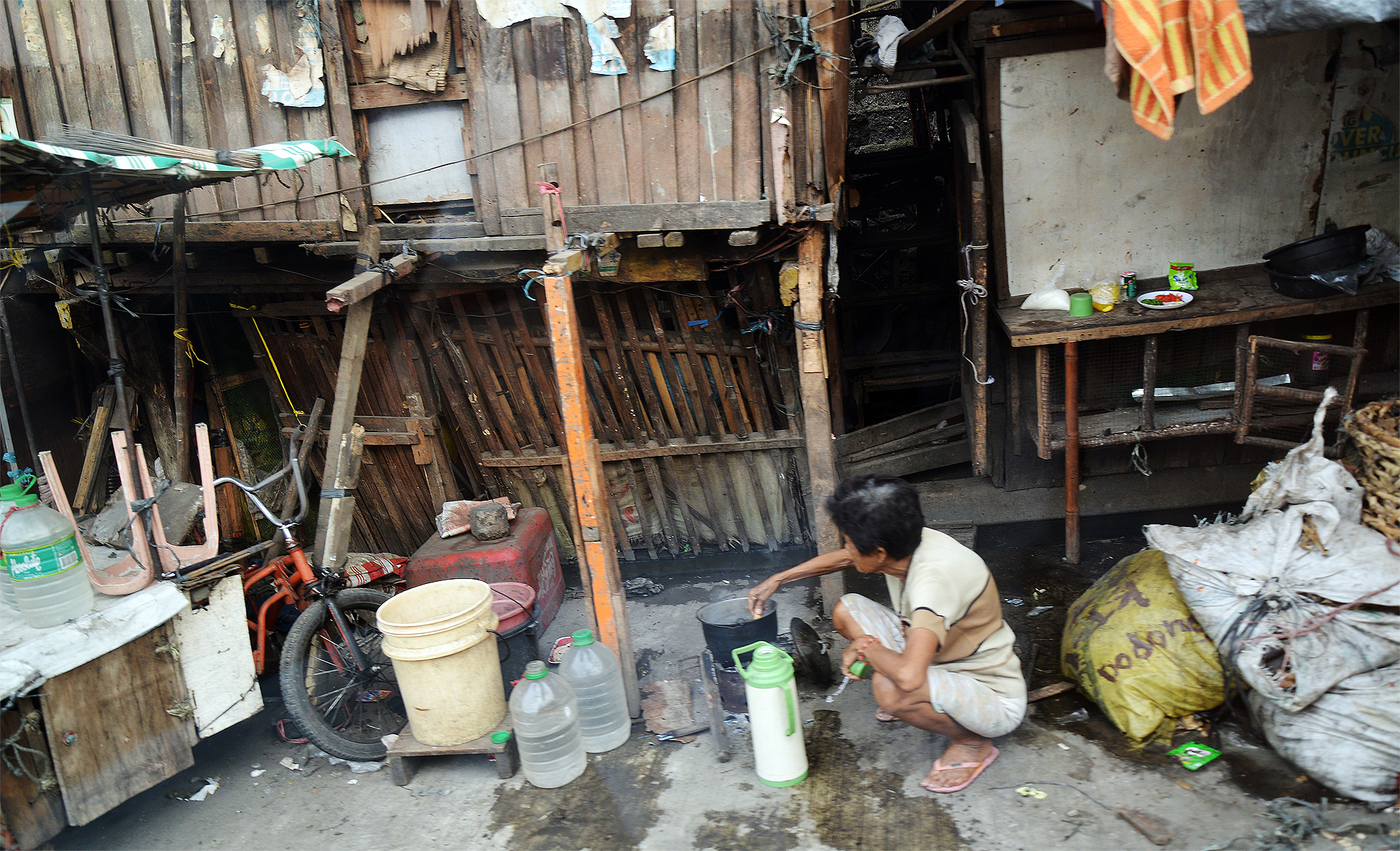
.jpg)
